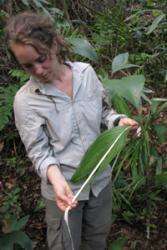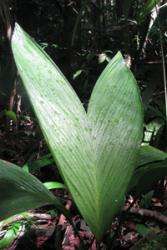Wild plants threatened by collection for sale could be grown commercially providing new income streams, report finds

Exotic palm leaves in your Mother’s Day bouquet may have come from forests in Belize or Guatemala, central America. Export for the flower arranging industry threatens the survival of some of these palms in the wild
There has been increasing interest in the cultivation of harvested plant species, aiming to reduce the use of wild populations and to improve human livelihoods. For this change to be possible, people need to have the knowledge to be able grow the plants themselves. In 2006 Belize Botanic Garden trained local farmers as part of a UK Darwin Initiative Project to cultivate xaté, an economically important palm species, which is at risk in the wild.
Bangor University and the Royal Botanic Gardens Kew, recently investigated whether the training had in fact had a beneficial effect. The research, reported in PLoS ONE, found that training increased technical knowledge about cultivating xaté and did result in people cultivating this over-harvested species.

The lead author of the study, Sophie Williams, of Bangor University said: “xaté palm leaves are exported to Europe and the USA for flower arrangements and is a multi-million dollar industry. People in central America can cultivate this species so not all the market supply needs to come from the wild”.
Dr. Colin Clubbe of the Royal Botanic Gardens, Kew and another author on the study goes on to explain “the training programme had influenced behaviour by providing the skills needed to grow a new species but also it increased peoples belief in their ability to grow a new species. This is critical for people to actually cultivate this important plant.The results from this study will help design training programmes for encouraging cultivation of over-harvested species.
The researchers call for future training programmes to consider providing resources to help people establish cultivation, such as seeds or young plants, in addition to providing technical skills needed to cultivate over-harvested species.
Provided by Bangor University











.jpg)
.jpg)








